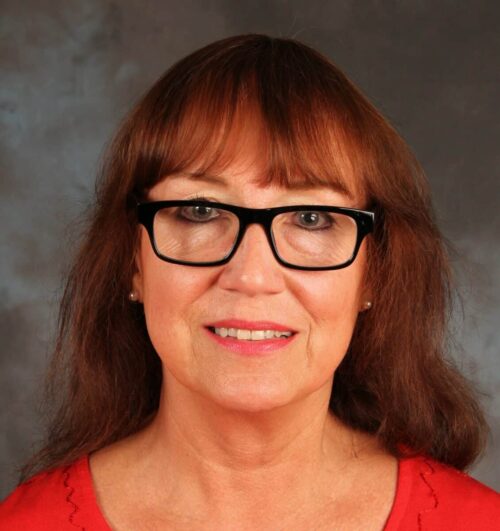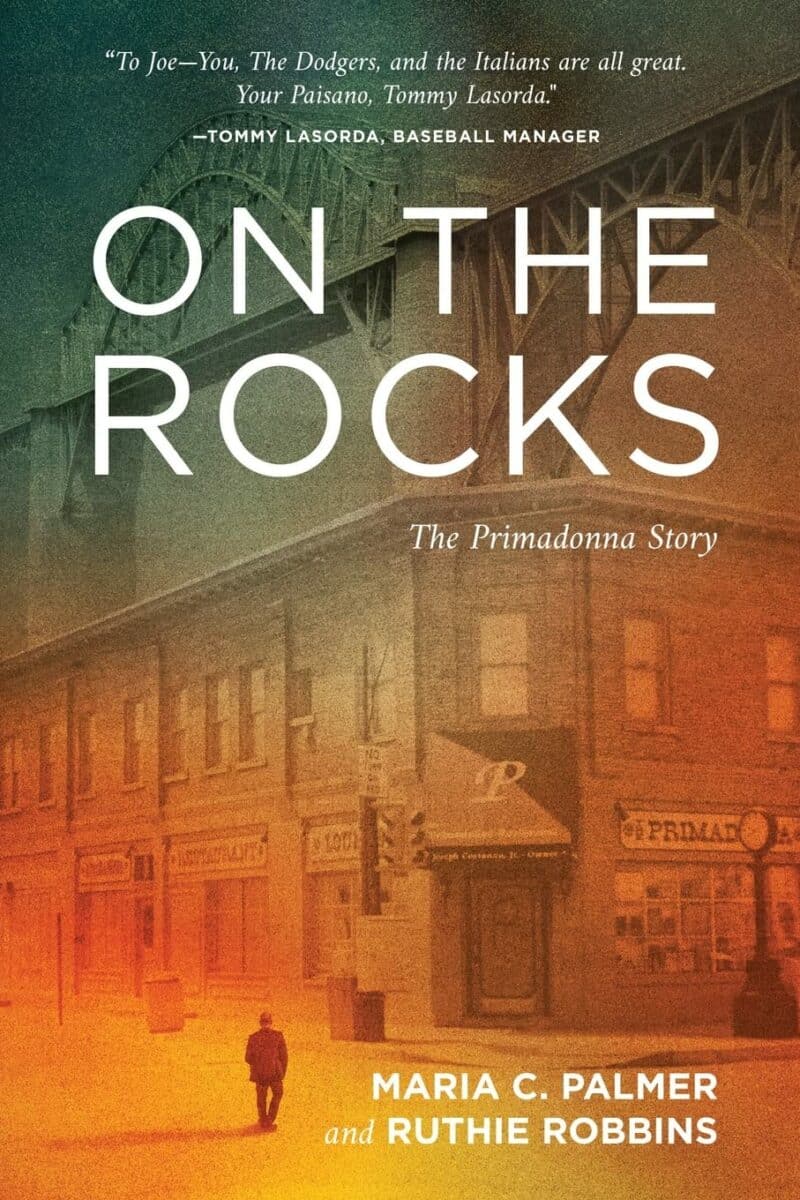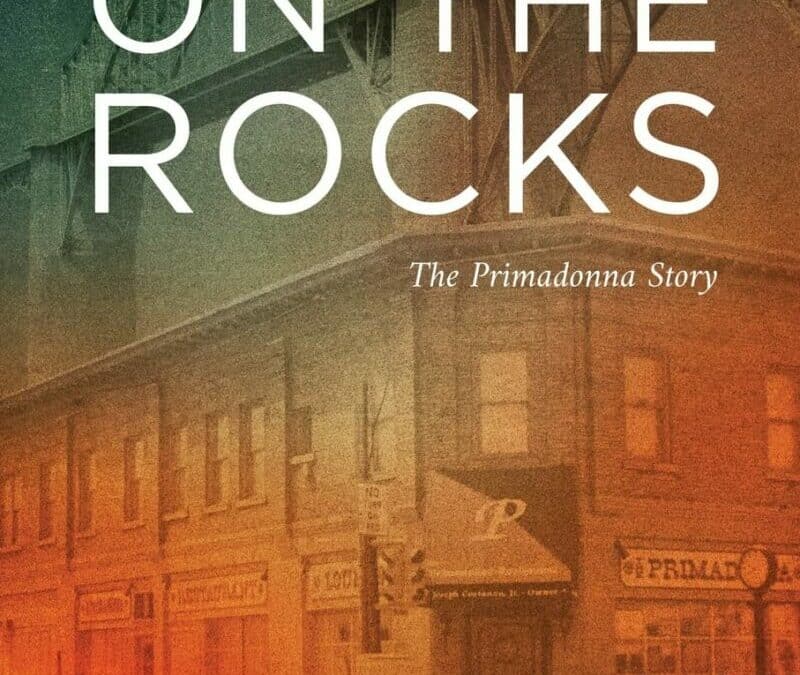
Maria Costanzo Palmer is an author and grant writer. Growing up as the oldest child of an award-winning restaurateur, Maria unexpectedly became a daughter of the incarcerated. This experience ignited an interest in working for Get on the Bus, a nonprofit dedicated to uniting children with their incarcerated parents. A former host on L.A. Talk Radio, Maria was recently featured on Food and Beverage Magazine Live and has made a number of media appearances. You can find Maria on FB and IG @joecostanzoprimadonna and on Twitter @mariacpalmer. For more information, visit www.mariacpalmer.com.

Ruthie Robbins is an award-winning educator who worked for the Montour School District in the suburbs of Pittsburgh, PA, and for Johns Hopkins University Talent Development Secondary. Ruthie grew up in “The Rocks” but now teaches English Language Arts and music in Buffalo, New York. Best known as co-creator of a popular interdisciplinary unit for Pittsburgh’s Kennywood Park, Ruthie is currently working on other books and is preparing to launch The Writing Factory Online, a comprehensive writing program for middle schools.

On the Rocks chronicles the real-life journey of restaurateur Joseph Costanzo Jr., from his rise to success in the 1990s as owner of the highly acclaimed Primadonna Restaurant, radio host, columnist, and aspiring politician to his sharp fall in the early 2000s, ending in an investigation and a stint in federal prison. Costanzo is a complex character, whom readers will admire for his confidence and rebuke for his arrogance, will love for his generosity and despise for his egotism, and will learn from in both his attention to detail and lack thereof. This driven, not-your-average-Joe is an unforgettable character who achieves the seemingly impossible but can’t help getting in his own way. Come along with Joe for a bumpy ride on the Rocks!
Q: What inspired you to write this story? Why tell it?
Maria: On the Rocks started some seventeen years ago as a family history project. It was during a tough time for our family (after my father unwillingly left his beloved restaurant) that I decided to ask him about the past.
I had intended for the project to be a cathartic way for my dad to reminisce about better years, but he kept telling me amazing stories like, “Did I ever tell you the time that Johnny from down the street brought in a stripper after hours, and they got in a fight? He left in a fury, and after she passed out in the bathroom naked, I had to figure out how to sneak her outside and get her home without the cops noticing.”
As a writer, I could tell that what he was saying was much larger than just a family history. It had commercial value and appeal. Ironically, since I was little, my father always said someone should write a book about his life. This just confirmed it. Hence, the concept of On the Rocks was born.
Even though I recorded and wrote all the stories, it wasn’t until I was paired with my wonderful coauthor Ruthie Robbins that the book became a reality. With the help of her Buffalo writing group, we made the crucial decision to write the book in my father’s voice, and it cleared a path for the story to emerge.
Q: What’s your writing process like? Do you storyboard, write when you have inspiration, or set aside designated time to write?
Ruthie: We had a drawn-out writing process that went something like this:
-
- Maria wrote the story in her spare time and in her own voice over several years.
- In 2017, Maria contacted me to edit the book, and I agreed. As I worked, I had a feeling that the daughter’s voice for this particular story wasn’t the best fit, as so much had happened that she was sheltered from as a child and learned afterward.
- I continued to edit while I taught and worked on my own books. I tried some scenes as the omniscient narrator but wasn’t happy with that, either.
- Lissa Redmond, a successful mystery author in my writers’ group, suggested we try telling the story in Joe’s voice, and writing became not only easier but fun.
- By 2020, the pandemic had spread. My school was teaching online. Joe had just gotten his second kidney transplant, but there was a lot of uncertainty about whether this one would stick. We needed to finish and publish the book. I asked for a leave of absence, but that wasn’t possible, so I ended up having to leave the job to work full-time on the book. Maria and I were in contact from morning ’til night, and we sometimes included Joe. We passed the pages back and forth, just as we’re doing with this article. We thought our communication was mostly by phone or text, but at the end of the year, we saw that we had 11,000 emails between us!
- When the book was finished (and Joe had received a second, successful kidney transplant), we still worked together daily, revising according to our beta readers’ feedback, working on the book proposal, and searching for an agent. Maria attended writers’ conferences and found our agent, Leticia Gomez, from Savvy Literary, and then we signed with Koehler Books. We still talk daily, but now it’s about promoting book sales.
As with anything to which a person gives this much time and energy, we both felt a strong sense of ownership with this book. We sometimes disagreed on what should be said or how it should be written, but we never argued or even felt a moment of tension. We respect each other, know differences are inevitable, and talk it through, often with laughter.
Q: What was the most challenging segment of the book to write? What was the least challenging or most thrilling?
Maria and Ruthie: We’ll answer that in reverse. We were easily able to write all the good—the accolades, the crowds, the favorable reviews, the celebrity visits, and the stories about people’s lives that Joe Costanzo had changed. That was easy. The Heinz History Center had curated over 100 documents that backed our story, as Joe had made a significant impact on the city of Pittsburgh.
What makes a character compelling, however, is not only the rise but the fall. People relate to human elements, and part of that is admitting fault and mistakes and identifying what was learned as a result. Although these segments of the book may be arguably the most compelling for the reader, it was the most challenging part for us to write. Joe was not a man who was used to showing vulnerability. It was a process, and there was still pain from leftover wounds. Sometimes it was tough, but ultimately, we all decided that we wanted to tell the entire story and not leave anything for interpretation.
Today, all can be Googled, and Joe Costanzo’s case was public record. What wasn’t there, however, was his own perspective of what happened, why, and what was learned. Once we essentially took back our pen and started to write these elements, the story flowed and became what it is today.
Q: If you were teaching a writing course, what would be your first lesson when it comes to the publishing process?
Maria and Ruthie: Our greatest lesson in the process is a tie:
-
- “You don’t know what you don’t know.” The publishing process is nebulous, and there are several paths to publication. None is wrong, but all are different. There is no handbook, and sometimes you have to poke around to figure out what is right for you and how to obtain it. We read books and took advantage of conferences, workshops, seminars, and online courses. We have learned much but are still learning.
- “You must be your biggest advocate.” There is so much competition out there, and in this genre, we were competing with countless celebrities who also wrote their memoirs during the pandemic. Success doesn’t necessarily come to the smartest or most famous person but rather to the most resilient. The same seems true in the world of publishing.
Q: Without offering too many spoilers, what’s the most unexpected, surprising part of Joseph Costanzo Jr.’s story?
Maria and Ruthie: The unconventional choices and risky decisions Joe Costanzo continually made, which worked both to his benefit and his disadvantage, are the most unexpected surprises to our story. Fiction writers intentionally try to throw a curve ball to the readers, but Joe did that naturally.
Q: If you had to do it all over again, is there an aspect of the process—writing or publishing—that you would change or do differently?
Maria: I sit here with no regrets. Would I change or do things differently now with the knowledge I have that I once didn’t? Sure, but that doesn’t taint the beauty of this entire seventeen-year journey for me.
I’ve gained a strong friend and sisterhood with my writing partner (once teacher) Ruthie. We both steadfastly believe that there is no coincidence that we were partners. Our synergy around the project has been amazing. My weaknesses are her strengths and vice versa. She also has the local perspective of having grown up on the street where the restaurant was located and is of the same generation as my father. She could also speak and write from the customer perspective, bringing things to light that I may have otherwise overlooked.
I have also fulfilled my father’s dream of his story being published and my dream of publishing a book. My father is not well. In the time that I was trying to finish the book, his eyesight failed him due to diabetes. He had to have major back surgery. He had to have emergency open-heart surgery. His kidneys failed, and he went on dialysis. He had not one but two kidney transplants. The first failed fifty days after, and the second landed him in a medically induced coma after an unexpected drug reaction during transplant surgery. He had also been hospitalized for major issues in between those major medical events, sometimes for more than two months at a time.
While this was all going on, I was struggling with two cross-country moves, getting married, having two children, moving into our first home, trying to settle in NJ, find a career, etc. Hence, I really wasn’t certain that I would ever be able to deliver on this dream of writing a book. The fact that this happened is a miracle. I feel blessed and lucky beyond measure.
Q: Borrowing from a favorite podcast, Work in Progress, by Sophia Bush, what do you feel is a constant work in progress in your life?
Maria: For me, I continue to struggle with overcommitting myself. I have so many passion projects and a big heart for helping others. I am constantly agreeing and saying “yes” to things that I just don’t have time and space for. I’ve improved over the past few years, but it is a work in progress for me. I am slowly learning that it is okay to say “no” without guilt to people and things that are beyond my current capacity.
Ruthie: Similarly, I always have “too many irons in the fire.” It’s all too common for me to sleep one hour per night. As I get older, I get worse because I feel like I’m running out of time to do all that I want to do. In May, I went nineteen days in a row sleeping between forty-five minutes and three hours a night, and the effects of sleep deprivation hit hard toward the end of that period.
Q: What is your hope for this book?
Maria: My utmost hope for this book, which was to finish and publish for my dad, has already been achieved. Given all the health troubles and challenges he’s been through, it is an extra blessing and a miracle that he’s been able to experience the joys of this book alongside us. My hope was to preserve a piece of family history and tell a really good story that’s been bottled up inside me for seventeen years. All that has happened with this book’s prerelease is an extra blessing, and we feel incredibly grateful. It is a lesson learned on persistence and never giving up on a dream.
Ruthie: My hope from the start has been that someone who works in film will read this book and see the potential for a highly entertaining network series. The real “Primadonna family” of workers and customers were as compelling as any fictional characters, and we left many pieces on our own cutting room floor. The stories contain both the comedy of Cheers and the drama of This Is Us.

